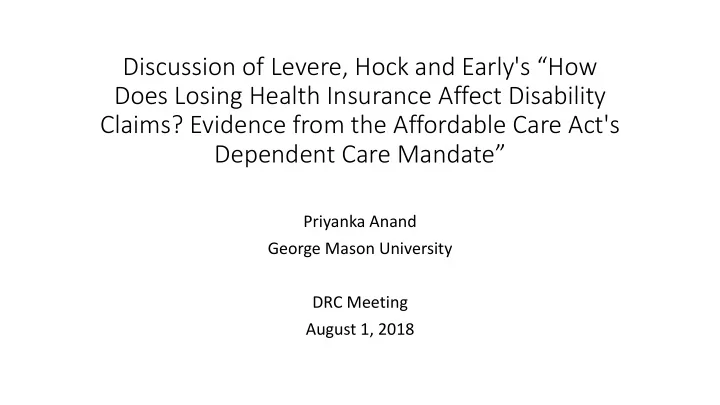

Discussion of Levere, Hock and Early's “How Does Losing Health Insurance Affect Disability Claims? Evidence from the Affordable Care Act's Dependent Care Mandate” Priyanka Anand George Mason University DRC Meeting August 1, 2018
Motivation: Health insurance-motivated disability enrollment • There is significant policy interest in understanding why enrollment in DI and SSI has been increasing over time • Past work has examined the role of screening, disability incidence, unemployment, aging population, etc. • Recent interest in exploring the role of health insurance-motivated disability enrollment, first proposed by Kennedy and Blodgett (2012). • Suggests that it might be more efficient to provide some people with health insurance (HI) directly than full disability benefits.
HI status of applicants for disability benefits • Livermore, Stapleton, and Claypool (2014) use the NHIS survey data to show the health insurance status of DI recipients ages 18-64. • In the 3 years before DI entry up to the end of the Medicare waiting period, 21.8% of DI recipients were uninsured. • Suggests that a significant number of DI recipients lacked health insurance before receiving benefits, which is likely to have contributed to their decision to apply for DI. May be similar for SSI. • If lack of HI is a driver of disability applications, one would expect a change in the availability of HI to have an impact on SSI applications.
Overview of LHE 2018 • Most of the past research has used Medicaid expansions to examine the relationship between health insurance access and SSI applications. • LHE 2018 use the ACA age 26 parental health insurance cutoff to compare SSI applications/awards for those just below the age threshold to those just above. They find: • 3.8% increase in annual SSI application rates in the 4-month window before turning age 26 and 1 month after. • 2.7% increase in the number of SSI awards for this same 5-month age window. • They conduct falsification tests that look for changes in this 5-month age window in the years before the ACA and do not find anything.
Implications of using the age 26 policy threshold • The sample is young • Most adult SSI applicants are older; 81% were above age 30 and only 6% between ages 26 and 29 in 2016 (SSI Annual Statistical Report 2016) • Younger people tend to prioritize health insurance less than others, but this population has disabilities so maybe not be true here. • The impacts are driven by people whose parents have family health insurance coverage (that is, higher income). • Again, this is not typical of adult SSI recipients.
Timing of impact on SSI awards • Should we expect differences in awards during the same age window as applications? • The application process for disability benefits can be very long: the average time for appeals - which are very common - take nearly two years (Social Security Advisory Board 2016) • Perhaps look at additional age windows that are a bit farther out from the application age window. • The current window would capture those who got an award at the initial determination (which usually takes 3 to 4 months) or after an appeal but applied a year or two before turning 26.
What is happening with those who are just above age 26? • Might expect an effect on applications for those just above age 26 due to procrastination or not being aware of the age limit (also mentioned in LHE 2018). • This is important because LHE 2018 compare the 4 months before turning 26 and one month after to the months just below and just above this window. • Descriptive statistics show a drop in application rates for those just above age 26, which I find surprising. Warrant further exploration? • Would be nice to see the pattern in SSI awards by age as well.
Summary • LHE 2018 uses a nice source of policy variation to provide interesting evidence of a relationship between HI availability and SSI applications/awards. • Would be helpful to think carefully about the population they are examining (those around age 26) and what that means for SSA/policy implications. • Also helpful to dig deeper into the results to try to understand the timing of when an impact on awards would be expected and why they find an impact for those just under age 26 but (potentially) not those just over.
Recommend
More recommend